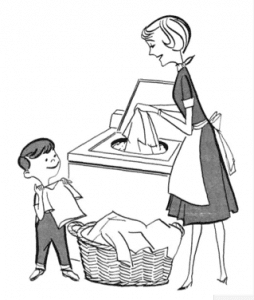Not ‘Til the Dishes are Done: Childhood, Chores, and Constant Expectations
CompetencyWorks Blog
 As with many children growing up in America, we had certain things we were expected to complete. Being young, it seemed as if most days were just a stringing together of different activities:
As with many children growing up in America, we had certain things we were expected to complete. Being young, it seemed as if most days were just a stringing together of different activities:
Some preferable like playing outside or having friends over…
While some, like the dishes, taking out the trash, swapping the wash, or cleaning up the room that my brother and I just destroyed…well…Not so much.
As I aged and took on more responsibility, my parents reinforced the fact that members of the house helped by getting things done. Simply stated, if I wanted to have a friend over or go out and play, I needed to get things done. No “ifs, ands, or buts” about it.
Through the process of completing chores, if I didn’t get one of the chores done, I didn’t get the reward. Even worse, if I didn’t do the chore right and it wasn’t done to my parent’s satisfaction, I had to go back and do it again. And again. And sometimes, again.
Sound familiar? Ever hear of any similar family systems? Live through something similar yourself?Many identify with this concept. Many felt the same pain as a child and are living through the reciprocating system now that they are the homeowners.
How can we apply this scenario to our lives as educators? I thought you would never ask 😉
1. Transitioning to competency means that you move on when ready.
As a teacher, I convey to my students that they can move on to the next thing when I see that they have mastered the task at hand. This means that students do not get credit if they do not validate what they know or are able to do in a proficient manner.
Coupled with this is the fact that many parents give the list of chores and expect that all are met before getting the reward at the end. For the most part, children don’t get to have half their allowance because they completed half the tasks. More applicable is the fact that you cannot half hang out with a friend, hang out with them for only half of the time, or have a half a friend come over. It’s usually “all or nothing.”
2. If you have not mastered a competency, we are going to work with you until you do.
Like the feedback about the dishes not being washed properly, as educators, we need to provide more opportunities for the student to show and prove what they know and are able to do. This doesn’t mean that it is open ended and without time limits (after all, things need to be done in a timely fashion if you really want your friend to come over…) but we do not shut off the opportunity with one misstep. Structured remediation goes a long way!
3. You do it in your own house already…why wouldn’t we use a system that works in school?
My favorite is when those not directly involved devalue the shift to competence. Many that do not understand the concept, view the competency-based education movement as a “new fandangled way to educate our kids, “ or a “new initiative”
Next time the question is raised by a parent, teacher, administrator, or even a student, use the analogy and watch as the understanding sets in. 🙂 Sometimes it just takes a great example that they can apply to their own lives to get them to see that the drive behind the action has been there all along… just in a different form!
If we want to keep moving forward, we need to enforce that the practices are one of progression. And the only way to “clean house” is to buckle down, get to work, and finish what we start. Trust me… they will thank you later when company arrives!
Justin Ballou is a high-school social studies teacher in New Hampshire. Besides teaching, he is active building/running an education startup called Socrademy, several business ventures, and enjoys spending time with his beautiful wife. With competency-based systems, edtech, and authentic learning as his go-to topics, you can reach him at [email protected] to ask questions or leave comments, and follow him on twitter (@socrademy).